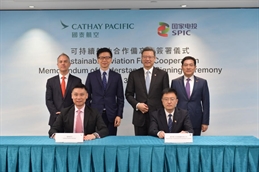
Cathay Pacific has teamed up with the State Power Investment Corporation (SPIC) to drive the further development of the Sustainable Aviation Fuel (SAF) supply chain in China.
SPIC is one of the largest state-owned energy companies in the Chinese Mainland and a company with the world's largest solar power installed capacity.
SPIC and Cathay Pacific have recently signed a Memorandum of Understanding (MoU) covering four SAF plants under SPIC.
The MoU signing was witnessed by Qian Zhimin, Chairman of SPIC and Chen Haibin, vice president; Ronald Lam, chief executive officer of Cathay Pacific Group; and Alex McGowan, chief operations and service delivery officer-designate.
It was signed by Yin Guoping, chairman of SPIC International Finance (HK) Co. Ltd., and Andy Wong, Cathay Pacific's general manager of corporate affairs.
"The signing of our cooperation pact is an important milestone in SPIC's sustainable development pursuits and a significant contribution by a Chinese enterprise towards supporting sustainable development in the global aviation sector," said Qian Zhimin, Chairman of SPIC.
"We hope both parties can build on our collaboration in the certification and purchase of SAF to further cooperate in areas pertaining to the industry supply chain, project development and securing the necessary policy support," he added.
Ronald Lam, CEO of Cathay Pacific Group, for his part, also welcomed the airline's collaboration with SPIC, which he said would "support and accelerate the development of the SAF industry in China."
"Cathay Pacific has a target of using SAF for 10% of its total fuel consumption by 2030, which is a core component towards reaching our goal of net-zero carbon emissions by 2050. This collaboration brings together the complementary advantages of SPIC's strengths in the field of clean energy with Cathay Pacific's expertise as an end-user of SAF," Lam said.
"We hope this partnership will play an important role in the decarbonisation of the aviation industry," the Cathay Pacific chief executive added.
Under the MoU, Cathay Pacific will share international experience and also feedback on the SAF certification process, value chain and overall market know-how to facilitate SPIC in the successful establishment of four SAF plants in the Chinese Mainland.
Lam noted that building and strengthening the SAF supply chain is an "ambitious goal" and one that requires extensive collaborative work with many stakeholders to achieve.
"We want to send a clear message that SAF is going to be the most important lever for achieving net-zero carbon emissions within the aviation industry and that there will be clear and stable demand from airlines," the Cathay CEO further said.
Four SAF plants commissioned from 2024
The announcement said four SAF plants are expected to be commissioned between 2024 and 2026, and each will have the capacity to produce 50,000 to 100,000 tonnes of SAF annually.
The plants will use a pathway similar to "Power-to-Liquids" (PtL) to generate the SAF, converting renewable electricity into liquid fuels.
Cathay Pacific noted that it is committed to pioneering the aviation industry's move towards more substantial use of SAF, especially in Asia.
In 2014, it was the first airline investor in Fulcrum BioEnergy, from which the airline has already committed to purchasing 1.1 million tonnes of SAF over 10 years, which covers around 2% of its pre-COVID-19 fuel requirements on an annual basis.
The airline also launched the Cathay Pacific Corporate SAF Programme — the first major programme of its kind in Asia — in 2022.
The programme provides corporate customers with the opportunity to reduce their carbon footprint from business travel or airfreight by contributing to the use of SAF, which was uplifted and used at Hong Kong International Airport for the first time as part of the programme.
Cathay Pacific plans to scale up the programme in 2023, extending the service to more corporate customers.



